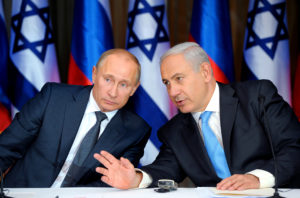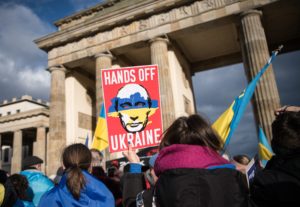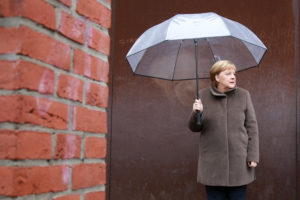I was a teenager when my father was posted to Munich, on secondment from British Aerospace to work on the Eurofighter Typhoon. None of us really understood what he did there — all I knew is that he was an ex-RAF engineer, had model cruise missiles as paperweights, and wouldn’t talk about his job.
But I suppose I had some idea what he was up to. Aged 17, studying for my A-levels at boarding school, and more interested in the female company of Munich than in the politics going on around me, my father’s work was off-limits. The Cold War was my adolescent playground.
There is one disturbing thing I do remember very vividly. My father was a member of the American PX in a little town 20 miles or so north of Munich. There was a cheap, tax-free supermarket there, and a recreational facility for its military members, including a golf course. There my father taught me to swing a club at a little white ball, to take pleasure in the satisfying sound of a well-struck shot. I still have the bug. But the name of the town was Dachau. And right next door to the club was the former concentration camp.
I still have disturbing dreams about that course, 40 year later, given how inappropriately it was situated. In some I slice a ball out of bounds and into the place where men, women and children were shot and burned — my fun-filled summer holidays coming into direct emotional contact with the horror of the Holocaust. The dreams interweave my father’s mysterious job, his Jewishness, the ovens of the camp, Hitler’s face on a violently defaced poster in the exhibition at Dachau, images of emaciated men being tortured in ice baths — all jumbled up with my own summer holiday recreation, barbecues down on the banks of the River Isar, the nudist colony in the Englischer Garten, of course, and my own teenage fumblings. Lots here for my shrink to unravel.
Of course, I felt guilty at having so much fun. Sex and golf were my peace dividend. My girlfriend was a pacifist; all of the people I met my age were pacifists. We sang 99 Luftballons by Nena. And in the year I arrived in Germany, 1981, a peace demonstration was held in Bonn, a protest both at the existence of nuclear weapons and at the presence of American and British bases on German soil. Around 300,000 people turned up that day: Christians, union members, students. I didn’t tell my new friends what my father did.
I also remember the graffiti. Munich was a seriously tidy and ordered town, but hate-filled graffiti was still puked up on the walls under flyovers, mostly about Turkish Gastarbeiters — immigrant workers. “What is the difference between a Turk and a Jew? Forty years”, was the one I cannot forget. The tidiness of the place wasn’t able to hide the fact that this was Hitler’s home patch.
How different Germany today is from the Eighties. At Berlin’s train stations — yes, trains too are inevitably a part of the nightmares — tens of thousands of Ukrainian refugees are now being welcomed by generous open-hearted German volunteers, providing shell-shocked families with hot drinks and food, advising them where to find permanent shelters. In 2015-16 Germany took in over a million refugees fleeing Syria, Afghanistan, and Iraq. During my lifetime at least, the Germans have been the conscience of Europe, responding to their defeat in the war and their national shame with a reinvention of their national consciousness.
This process — Vergangenheitsbewältigung, or “overcoming the past” — was the only way Germany could come to terms with Nazism and the Holocaust. Nobody wants to look at the darkest parts of their history. It is the equivalent of discovering that your parents were killers. After decades of post-war denial, a new German generation, coming of age in the Sixties, insisted on digging up the past. They were called Nestbeschmutzer (“nest-foulers”) and were derided. But what they began set in motion the process that created modern Germany.
Today, the country pauses to engage in what the historian Susan Neiman calls “public rites of repentance” around events such as Kristallnacht, and the liberation of Auschwitz. There are the “stumbling stones” — plaques placed throughout Berlin to mark where Jews lived before the Nazis deported them. And, where it cannot be missed, at the centre of the capital: the Holocaust Memorial.
Of course, there was (and is) some barely hidden recidivism — especially in the East. But I never really encountered it, apart from dark messages scrawled under flyovers. I lived in Germany before the wall came down. For me, Germany was a place of peace and love. But also a place of hidden secrets. They only met in sleep, when a golf ball was sliced from one psychic realm to another.
Two weeks ago, the new German Chancellor, Olaf Scholz, announced a massive €100 billion rise in German defence spending. This includes the purchase of F-35 fighter jets capable of carrying nuclear weapons. The rational side of my brain thinks this is a good thing, the Germans rising to the challenge of this new era of Russian aggression. For too long, the Germans have not contributed their fair share to Nato — something Nato has calculated as 2% of GDP — or to the defence of the vulnerable globally. Some might say that they have freeloaded on the defence spending of other countries, and kept their own hands clean by relying on others to make the impossible moral decisions that keep down dictators like Assad and Putin. But my emotional side mourns the final end of that 1981 summer of love in Germany and fears the sight of what looks to me like an Iron Cross on the side of the aeroplanes that my father helped to develop.
Putin’s war against Ukraine has destroyed the long taboo about Germany and the military. After the war, the Germans were allowed to maintain a small army, looking East across the wall, towards the Soviet Union. Out of the ruins of the Forties, a kind of default pacifism was established as the norm.
As recently as 2019, the German government refused to even consider an American request to send ground troops into Syria. One year previously, 72% of the population were against committing the German military against Assad, even if he was using chemical weapons against his own people.
On the 70th anniversary of the Allied landing in Normandy, the head of the German Evangelical church, Margot Käßmann , refused to countenance the idea that the defeat of the Nazis could constitute a just war: “There can be no just war,” she said. “That was even true of the Second World War”. No one pushed back against this. “German pacifism is here to stay,” wrote the political editor of Die Zeit in 2019, “and there is no use asking the country to be what it isn’t.”
All of which makes the events of recent weeks so much more extraordinary. German pacifism is no more. Germany is about to have the third largest defence budget in the world, behind only the US and China. Some will feel that this is as it should be. For others it will bring back dark and disturbing memories. For me, it is both.
Disclaimer
Some of the posts we share are controversial and we do not necessarily agree with them in the whole extend. Sometimes we agree with the content or part of it but we do not agree with the narration or language. Nevertheless we find them somehow interesting, valuable and/or informative or we share them, because we strongly believe in freedom of speech, free press and journalism. We strongly encourage you to have a critical approach to all the content, do your own research and analysis to build your own opinion.
We would be glad to have your feedback.
Source: UnHerd Read the original article here: https://unherd.com




